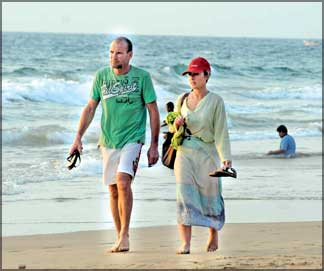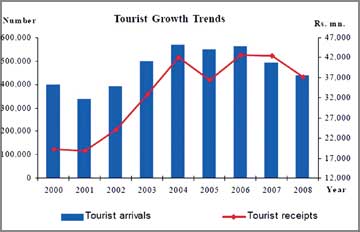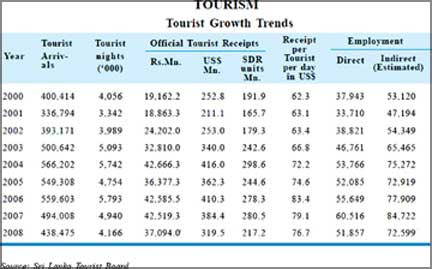Developing tourism in Sri Lanka and challenges
Lionel WIJESIRI
Tourism industry participants, both in Sri Lanka and abroad, agree
that there is a number of reasons why the Government should now begin to
think out of the box about the tourism sector and prepare a strategic
plan for the next ten years. Most important of the reasons is our
country’s unique and abundant natural resources and the hospitality
skills of our people. Some of them also believe that there should be a
change in our brand projection.
|

Tourism, a key industry for economic development |
In the promotion of tourism internationally, it is suggested Sri
Lanka ideally should be represented as a rural holiday destination. This
concept makes sense. It is a fact that in coming to Sri Lanka, visitors
are motivated by the perception of beautiful virgin scenery,
opportunities for sightseeing, and relaxed pace of life. It is necessary
therefore to take account of the global trends in tourism, which may
impact on the sector in Sri Lanka, and especially on tourism flows to
rural areas.
In the coming decades there will be stronger demand for more
customized products and services, as well as greater emphasis on value
for money, personal fulfillment, authenticity and travel convenience.
The Government should, therefore, ensure that those closer linkages
exist between tourism policy and other policy areas such as arts and
culture.
Tourism in Sri Lanka
Organized tourism was institutionalized in Sri Lanka in 1996 and
since then we have been experiencing a reasonable average growth. In the
years of 2007 and 2008 there has been a decline in arrivals. In 2007, it
was 494,000 and in 2008 it plummeted down to 438,400. The attributing
reasons were the internal war against tigers and the global economic
slump. Last year, it has stabilized itself at 439,000.
However, tourist arrivals in the last few months have seen a steady
increase. For example, in January 2010, the arrivals reached 50,000,
which is 32 per cent increase against the same period in 2009. These are
good signs and we could look forward for a brighter future.

Sri Lankan tourism is a complex and diverse sector of economic
activity incorporating many players across the public and private arena.
That is why we need to think out of the box and work out a long-term
plan which would provide a consistent framework within which the
different parts of the industry could operate, to create a development
dynamic that is greater than the sum of the individual parts.
Key issues
Against the current background, it is possible to identify a number
of issues relating to the development of tourism in Sri Lanka.
First, there is an urgent need for a clear, market driven tourism
strategy that directs the future marketing and development of key
tourism attractions towards greater diversification and market
expansion. Such a strategy may imply substantial government investment
(e.g. road development and upgrading, airstrip improvements, provision
of accommodation etc.) to make tourism areas and attractions more
accessible and appealing to a wider range of potential tourist segments.
By effectively planning, in accordance with market requirements - a
substantial spectrum of visitors could be attracted and satisfied.
The existing approach is primarily supply driven and does not give
due recognition to demand trends, market scope and variations of various
market segments. Such a market-oriented approach is particularly
relevant in view of recent global events that have led to a slowdown in
global travel and increased competition among destinations.
Issues for tourism industry
The first of these issues is the need to define clearly the relative
roles of the private local and foreign tourism partners in development
decisions. The key issue for all concerned is to recognize that the
development decisions made by them do have wider economic consequences
for Sri Lanka. It is therefore imperative that investors recognize the
implications of their actions in the overall interest of the long-run
economic sustainability of the tourism sector.

The second major challenge is the need to develop human resources,
particularly indigenous personnel, both for reasons of delivering
quality services for tourists, as well as enhancing general skills of
the local workforce. Achieving these broad objectives will potentially
encourage utilization of local suppliers and thus enhance their
productivity. In this sense, the spin-off effects are obvious: for
example, foreign exchange will be retained locally and further income
would be earned.
Thirdly, there are problems facing the local tourism industries in
Sri Lanka that are characterized by a large number of small tourism
enterprises. Although they serve useful functions in tourism (e.g. the
development of linkages, providing personal service, etc), but for most
of them, life is a daily struggle, with many of them operating at the
margin of survival. They also lack the requisite experience to run
tourism business along modem management principles. Even the nature of
tourism demand renders them uncompetitive as they are unable to
capitalize on the advantages that accrue from the economies of scale.
The real challenge is for them to develop marketing strategies that
would enable them to overcome some of these difficulties and thereby
sell their products. Again, their limited resource base makes this
objective hard to achieve.
Issues for Government
The traditional role of government is to formulate policy for the
tourism sector. The focus should now be changed to suit today’s market
conditions. The challenge for the Government is to formulate tourism
sector policies that best reflect the new thinking.
Some important areas need policy re-orientation. This could be done
with the consultation with local communities in the planning process and
forging partnership with the private sector. The policy issue needs to
be linked to devising viable and sensible options for financing tourism
infrastructure. Another aspect of policy re-focusing is the
entrepreneurial development initiatives. In essence, the policy should
reflect identifying ways in which the benefits from tourism activity can
be spread more evenly throughout the society.
Policy considerations
The Government should identify all elements that are relevant to the
long-term sustainable development of tourism. The development of the
sector needs to be supported by large inflows of foreign resources (e.g.
financial, personnel).
This brings us to an important point, namely, that tourism
development cannot be separated from other facets of economy, society
and politic. Merely creating national and regional institutions or
planning bodies responsible for tourism is hollow in the absence of the
political mandate and adequate resources to do their jobs. Here lies
much of the difficulties with developing tourism in Sri Lanka-resulting
from ineffectual policies. This holds the key to future advances in
tourism development in the region.
In the same way that political support and adequate resourcing hold
the key to Sri Lanka’s future tourism development, so too is the need to
educate the people. This can be done in a variety of ways: by creating
in them an awareness of the benefits of tourism, by allowing them access
to entrepreneurial opportunities offered by tourism, permitting women a
role in the industry, and perhaps finally giving them a sense of
ownership in the sector.
Sri Lankan tourism policy strategies should aim to redress these
deficiencies. It then means that the existence of credible political,
commitment on the part of the Government is a sine qua non to the
realization of such strategies. |



